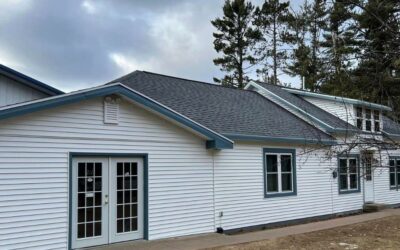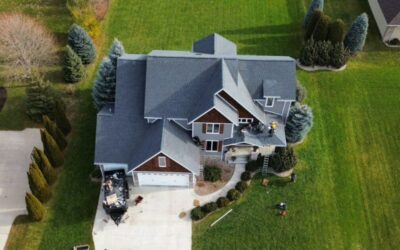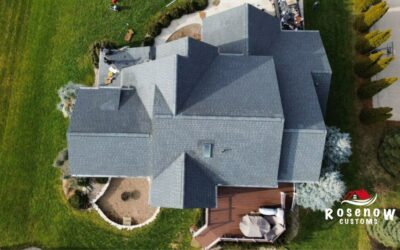When it comes to protecting your home, few decisions are as important as choosing the right roofing material. Two of the most popular options on the market today are metal roofing and asphalt shingles. Both have their unique advantages and disadvantages, and the best choice for your home will depend on a variety of factors, including your budget, climate, and personal preferences. In this article, we’ll take an in-depth look at metal roofing and asphalt shingles to help you make an informed decision. If you’re considering these materials for your next project, Rosenow Customs can provide expert residential roofing services in Neenah, Wisconsin to meet your needs.
Choosing between Metal Roofing and Asphalt Shingles
Your roof is your home’s first line of defense against the elements, and choosing the right roofing material is crucial for ensuring the longevity and protection of your property. Metal roofing and asphalt shingles are two of the most common residential roofing options, each with its own set of pros and cons. When deciding on a new roof, it’s essential to carefully evaluate factors such as initial cost, longevity, maintenance requirements, energy efficiency, and aesthetics. By understanding the key differences between metal roofing and asphalt shingles, you can make a well-informed choice that best suits your home and your needs.
Asphalt Shingles Overview
What are asphalt shingles?
Asphalt shingles are the most widely used roofing material in North America, known for their affordability and versatility. These shingles are made of a fiberglass base mat coated with asphalt and topped with ceramic granules that provide color and protection from UV rays. The two main types of asphalt shingles are 3-tab shingles, which have a uniform, flat appearance, and architectural shingles, which are thicker and have a more textured, dimensional look.
Advantages of asphalt shingles
- Relatively low upfront cost compared to other roofing materials
- Easy to install, with a wide range of roofing contractors familiar with the process
- Available in a variety of colors and styles to complement different home aesthetics
Disadvantages of asphalt shingles
- Shorter lifespan compared to metal roofing, typically lasting 12-20 years
- Require more frequent maintenance and repairs to address issues like cracking, curling, or granule loss
- More susceptible to weather-related damage, such as wind uplift or hail impact
Metal Roofing Overview
What is metal roofing?
Metal roofing is a durable and long-lasting roofing option that has gained popularity in recent years. It can be made from various materials, including steel, aluminum, copper, and zinc. Metal roofing comes in two main styles: standing seam, which features raised seams that run vertically along the roof, and metal shingles, which mimic the look of traditional asphalt shingles or other materials like slate or tile.
Advantages of metal roofing
- Exceptional longevity, with many metal roofs lasting 50-150 years
- Low maintenance requirements, as metal roofs are resistant to issues like cracking, curling, or algae growth
- Excellent energy efficiency, thanks to the reflective properties of metal that can help reduce cooling costs
Disadvantages of metal roofing
- Higher upfront cost compared to asphalt shingles, which can be a barrier for some homeowners
- More complex installation process that requires specialized skills and tools
- Potential for noise during heavy rain or hail, although this can be mitigated with proper insulation and underlayment
Cost Comparison
Upfront costs
One of the most significant factors in choosing between metal roofing and asphalt shingles is the initial cost. Asphalt shingles are generally the more affordable option, with prices ranging from $5 to $10 per square foot installed. Metal roofing, on the other hand, can cost anywhere from $10 to $20 per square foot installed, depending on the type of metal and the complexity of the roof. It’s important to note that factors like the quality of materials, the slope and pitch of your roof, and local labor costs can all impact the final price.
Long-term costs
While metal roofing has a higher upfront cost, it can often be a more cost-effective choice in the long run. Thanks to its exceptional durability and longevity, a metal roof may never need to be replaced, whereas asphalt shingles will typically need to be replaced every 12-20 years. Additionally, metal roofs require less frequent maintenance and repairs, which can save you money over time. Finally, the energy-efficient properties of metal roofing can lead to lower cooling costs, further offsetting the initial investment.
When considering the long-term costs of your roofing choice, it’s essential to factor in the impact of inflation. A metal roof can be a smart investment that locks in today’s prices and protects you from rising costs down the line. For example, an asphalt roof that cost $13,000 five years ago would now cost around $20,000 due to inflation – a 54% increase. With metal roofing, you pay more upfront but eliminate the need for costly replacements every 12-20 years. As inflation continues to drive prices up, a metal roof provides a stable, predictable cost that can lead to substantial savings over your lifetime in the home.
Durability and Lifespan
Asphalt shingles
Asphalt shingles are a reliable and durable roofing option, with a typical lifespan of 12-20 years. However, they are more susceptible to wear and tear than metal roofing, and may experience issues like curling, cracking, or granule loss over time. The lifespan of asphalt shingles can also be impacted by the climate, with harsh sun, heavy rain, or frequent temperature fluctuations accelerating the deterioration process.
Metal roofing
Metal roofing is renowned for its exceptional durability and longevity, with many metal roofs lasting 50-150 years. Metal roofs are highly resistant to wind, hail, fire, and other environmental hazards, making them an ideal choice for homes in areas prone to extreme weather conditions. Additionally, metal roofs experience minimal weathering and fading over time, maintaining their appearance and structural integrity for decades.
Energy Efficiency
One of the key advantages of metal roofing is its superior energy efficiency compared to asphalt shingles. Metal roofs have reflective properties that can help keep your home cooler in the summer by reflecting sunlight and heat away from the building. This can lead to lower cooling costs and improved comfort levels inside your home. In contrast, asphalt shingles tend to absorb more heat, which can contribute to higher indoor temperatures and increased energy consumption.
Many metal roofing products are available with cool roof coatings or Energy Star ratings, further enhancing their energy-saving potential. While asphalt shingles can also be designed with cooling properties, they are generally less effective than metal roofs in this regard.
Maintenance and Repairs
Asphalt shingle maintenance
To ensure the longevity and performance of an asphalt shingle roof, regular maintenance is essential. This includes:
- Conducting periodic inspections to identify any signs of damage, wear, or aging
- Cleaning the roof to remove debris, algae, or moss growth
- Replacing damaged or missing shingles promptly to prevent leaks and further deterioration
While asphalt shingle maintenance is relatively straightforward, it does require ongoing attention and can be more time-consuming compared to metal roofing.
Metal roof maintenance
One of the significant advantages of metal roofing is its minimal maintenance requirements. Metal roofs are resistant to issues like cracking, curling, or algae growth, which means they require less ongoing care than asphalt shingles. However, it’s still important to conduct periodic inspections to check for any signs of damage, loose fasteners, or debris accumulation.
In the event of minor damage, such as scratches or chips in the finish, touch-up paint can be applied to prevent rust and maintain the roof’s appearance. Overall, metal roofs require less maintenance than asphalt shingles, which can save you time and money in the long run.
Aesthetics and Curb Appeal
Asphalt shingle options
Asphalt shingles are available in a wide range of colors and styles, making them a versatile choice for many homes. They can mimic the look of other roofing materials, such as wood shakes, slate, or clay tiles, allowing you to achieve a specific aesthetic without the higher cost or maintenance requirements of those materials. Asphalt shingles can also blend seamlessly with various architectural styles, from traditional to modern.
Metal roofing options
Metal roofing has come a long way in terms of aesthetics, with a growing range of colors, finishes, and styles available. While standing seam metal roofs are known for their sleek, contemporary look, metal shingles can mimic the appearance of traditional roofing materials like slate, tile, or wood shakes. This versatility allows metal roofing to complement a wide range of architectural styles, from rustic to modern.
Additionally, metal roofing can be customized with unique colors or finishes to create a one-of-a-kind look for your home. Some metal roofing products even offer the option to mix and match colors or create patterns for a truly personalized design.
Making Your Decision
When choosing between metal roofing and asphalt shingles, it’s essential to consider your specific needs, priorities, and budget. Some key factors to keep in mind include:
- Upfront cost vs. long-term value: While metal roofing has a higher initial cost, its longevity and energy efficiency can make it a more cost-effective choice in the long run.
- Climate and weather considerations: If you live in an area prone to extreme weather conditions, such as high winds, hail, or wildfires, metal roofing may offer better protection for your home.
- Architectural style: Consider which roofing material will best complement the style of your home and neighborhood.
- Maintenance requirements: If you prefer a low-maintenance roofing option, metal roofing may be the better choice for you.
It’s also a good idea to consult with roofing professionals who can assess your specific needs and provide personalized recommendations based on your home, budget, and priorities.
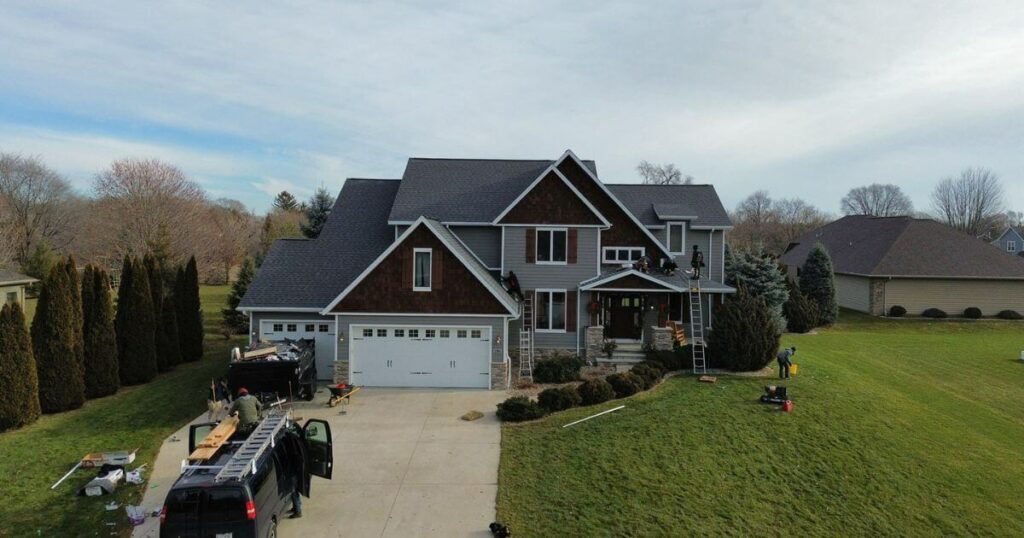
Frequently Asked Questions
How much longer does a metal roof last compared to asphalt shingles?
On average, a metal roof can last 50-150 years, while asphalt shingles typically last 12-20 years. This means that a metal roof can last 2-3 times longer than an asphalt shingle roof.
Can you install metal roofing over existing asphalt shingles?
In some cases, yes. If your existing asphalt shingle roof is in good condition and has only one layer, a metal roof can be installed directly over it. This can save time and money on the installation process. However, if your asphalt shingle roof is damaged or has multiple layers, it will need to be removed before installing a metal roof.
How noisy are metal roofs during rain or hail?
Metal roofs can be slightly noisier than asphalt shingles during heavy rain or hail. However, this noise can be minimized with proper insulation and underlayment. In many cases, the noise level is comparable to that of an asphalt shingle roof.
Do metal roofs attract lightning strikes?
No, metal roofs do not attract lightning strikes. In fact, if a metal roof is struck by lightning, it can help dissipate the energy safely and reduce the risk of fire or damage to your home.
How do metal and asphalt roofs compare in terms of weight?
Metal roofs are generally lighter than asphalt shingles. A typical metal roof weighs between 0.7 to 1.5 pounds per square foot, while asphalt shingles weigh around 2 to 4 pounds per square foot. This lighter weight can be an advantage for homes with structural limitations or in areas with heavy snowfall.
Can you walk on a metal roof without causing damage?
Yes, you can walk on a metal roof without causing damage, provided you take the proper precautions. When walking on a metal roof, it’s important to wear soft-soled shoes and walk on the areas supported by the underlying structure, such as the roof decking or purlins. Avoid walking on unsupported areas or ribs, as this can cause denting or other damage.
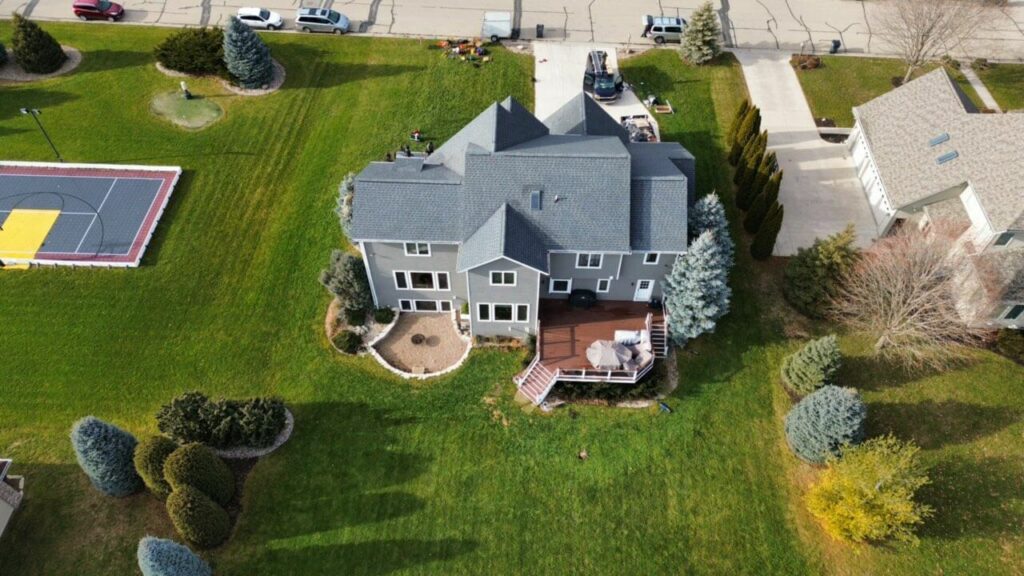
Trust Rosenow Customs to Guide you in choosing the best Roofing Material for your Home
Choosing between metal roofing and asphalt shingles is a significant decision that requires careful consideration of your budget, home’s style, climate, and personal preferences. While metal roofing offers exceptional durability, energy efficiency, and low maintenance, asphalt shingles provide an affordable and versatile option with a proven track record.
Ultimately, the best roofing material for your home will depend on your specific needs and priorities. By understanding the key differences between metal roofing and asphalt shingles and weighing the pros and cons of each option, you can make an informed decision that will provide lasting protection and value for your home.
If you’re still unsure about which roofing material is right for you, don’t hesitate to reach out to the experts at Rosenow Customs. Our experienced team can provide personalized guidance and help you find the perfect roofing solution for your home and budget. Contact us today to schedule a consultation and take the first step toward protecting your home with a beautiful, durable, and efficient roof.



